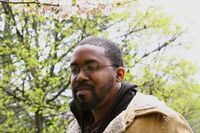Poets in Profile: February Writer-in-Residence Dane Swan
We're excited to introduce our February 2017 writer-in-residence, Dane Swan, whose most recent book, A Mingus Lullaby (Guernica Editions), is a fascinating poetic examination of musician, composer and civil rights activist Charles Mingus. Mingus was a larger-than-life figure who claimed to be three people, had one of his wedding ceremonies performed by Allen Ginsberg, and collaborated with the likes of Langston Hughes and Joni Mitchell.
We're excited to hear from Dane throughout the month of February in his role as Open Book's WIR, and you can get to know him and his writing today through our Poets in Profile series interview with him.
Dane tells us about his amazingly early introduction to reading, the Canadian poetry book he's most excited to read, and gives us a frank and necessary perspective on the experience of writing and publishing as a person of colour.
Open Book:
Can you describe an experience that you believe contributed to your becoming a poet?
Dane Swan:
I learned to read at a ridiculously early age. I was months old when I could read. Best guess, poetry was short, and easy to digest at that age.
OB:
What is the first poem you remember being affected by?
DS:
When I was 5 or 6, I remember reading Robert Frost and thinking, “You can do that with words?” Before that, my experience with poetry was The Cat in the Hat, Sesame Street, and fairy tales. It was fun, but it was all goofy, childish rhymes. When I realized that poetry could do more, it blew me away. Robert Frost was the first poet who opened my eyes.
OB:
What one poem—from any time period—do you wish you had been the one to write?
DS:
Leaves of Grass.
OB:
What has been your most unlikely source of inspiration?
Your CanLit News
Subscribe to Open Book’s newsletter to get local book events, literary content, writing tips, and more in your inbox
DS:
To me, no source of inspiration is a surprise. When I teach workshops, I tell writers to constantly keep notes. Write notes on your cellphone if you don't have paper. There is no unlikely source of inspiration for a writer. The only question is, when inspiration hits you, do you make note of it?
OB:
What do you do with a poem that just isn't working?
DS:
Most of my poems at some point end up handwritten. The poems I don't use end up in a plastic bag in a box in my closet. I rarely write poetry for literary journals. But, if a journal invites me to submit my work, I go into that bag, find something that I can edit into a publishable piece and submit it. I like reading journals, and there's a skill to writing poetry for journals. I'm just not interested in honing that skill.
OB:
What was the last book of poetry you read that really knocked your socks off?
DS:
It's been a while. So much of what's being published currently is about being on trend, rather than being a work of importance. I just traded books with Soraya Peerbaye. I'm really looking forward to reading Tell. There's an urgency and depth to it that I've discovered in my first few scans of it. It's been a while since I've been excited to read someone's work.
OB:
What is the best thing about being a poet…and what is the worst?
DS:
The best part of being a poet are the people you meet. I've met people from all sorts of corners of Canada, the US Midwest, and the West Coast. Some of them have become Facebook friends. Others have become my actual friends.
The worst part? Literary politics. As a person of colour I'm always on the losing side of politics in the literary scene. Sometimes the racism is blatant, yet the “Golly gee whiz,” looks on peoples' faces when you call them on their behaviour is over the top. Seriously, look at your event/the people you publish/writers you hang out with -- if you live in a diverse city like Toronto, you're not allowed to have a less diverse crowd than a poetry reading/publisher/group of writers in say Brantford (by the way, Brant Rant is awesome) and be comfortable with that. It's stupid. The senseless racism that black writers face in certain circles in Canada is stupid. It's self defeating to the industry. It's lazy and it's hidden under the veneer of false liberalism. People who talk about tolerance instead of respect. Who see certain POC as “them.” Who are comfortable in literary circles with little to no diversity. If you only publish the same two or three authors of colour (that everyone else publishes to appear “diverse”), as a publisher, you're also part of the problem. Seriously, don't get me started on the nonsense I've had to deal with.
_________________________________________________
Born in Bermuda, Dane Swan's poetry can be found in anthologies and poetry reviews in the UK, France, Bahamas, and Canada. His first collection, Bending the Continuum, was published in 2011 by Guernica Editions and his second, A Mingus Lullaby, in 2016.
You can write to Dane throughout the month of February at writer@open-book.ca




